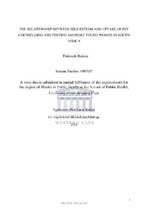| dc.contributor.advisor | Knight, Lucia | |
| dc.contributor.advisor | Mothupi, Mamothena | |
| dc.contributor.author | Budaza, Thokozile | |
| dc.date.accessioned | 2019-06-10T09:27:15Z | |
| dc.date.available | 2019-06-10T09:27:15Z | |
| dc.date.issued | 2018 | |
| dc.identifier.uri | http://hdl.handle.net/11394/6890 | |
| dc.description | Magister Public Health - MPH | en_US |
| dc.description.abstract | High HIV incidence among young women is a global public health concern with the potential for a huge impact on their lives. Several interventions have been identified to help reduce HIV incidence among young women, including HIV Counselling and Testing (HCT). Lack of knowledge of HIV status is a major barrier to HIV prevention, care and treatment efforts. Therefore, HCT uptake among young women needs to be up-scaled. Early detection and treatment can help cushion the impact of AIDS on the lives of young women. There are various factors that negatively influence young women’s HCT uptake, including psychosocial characteristics. Studies have linked self-esteem to HCT and high levels of HIV risk behaviour practices among young women. The aim of this study was to assess the relationship between self-esteem and HCT uptake among young women (16 to 24 years) in South Africa using data from the 2012, Third National HIV Communication Survey (NCS).
This was a quantitative secondary data analysis of cross-sectional data from the 2012 NCS. The participants of this study were young women (n =1922) from all provinces in South Africa. The independent variable was self-esteem and the dependent variable was ever testing for HIV and testing in the last 12 months, with a number of socio-demographic characteristics as covariates. Data was analysed using STATA statistical software (version 13.0, STATA Corp., College Station Texas, USA). Socio-demographic characteristics were described through descriptive statistics. The relationship between independent variables and HIV testing was analysed with Chi-squared tests of association. Logistic regression models were used to examine the relationship between self-esteem and HCT uptake when controlling for confounders. | en_US |
| dc.language.iso | en | en_US |
| dc.publisher | University of the Western Cape | en_US |
| dc.subject | Adolescents | en_US |
| dc.subject | HIV Counselling and Testing (HCT) | en_US |
| dc.subject | National Communications Survey (NCS) | en_US |
| dc.subject | Self-esteem | en_US |
| dc.subject | HIV/AIDS | en_US |
| dc.title | The relationship between self-esteem and uptake of HIV counselling and testing among young women in South Africa | en_US |
| dc.rights.holder | University of the Western Cape | en_US |

